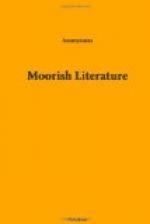[1] Joly, Poesie Arnaduno chez les Nomades Algeriennes. Revue Africaine, XLV, pp. 217-219. Alger, 1901, 8vo.
To finish with the modern literature of the northwest of Africa, I should mention a style of writings which played a grand role some five centuries ago, but that sort is too closely connected with those composing the poems on the Spanish Moors, and of them I shall speak later. It remains now to but enumerate the enigmas found in all popular literature, and the satiric sayings attributed to holy persons of the fifteenth century, who, for having been virtuous and having possessed the gift of miracles, were none the less men, and as such bore anger and spite. The most celebrated of all was Sidi Ahmed ben Yousuf, who was buried at Miliana. By reason of the axiom, “They lend but to the rich,” they attributed to him all the satirical sayings which are heard in the villages and among the tribes of Algeria, of which, perhaps, he did pronounce some. Praises are rare:
“He whom you see, wild and tall,
Know him for a child of Algiers,”
“Beni Menaur, son of the dispersed,
Has many soldiers,
And a false heart.”
“Some are going to call you Blida
(little village),
But I have called you Ourida (little rose).”
“Cherchel is but shame,
Avarice, and flight from society,
His face is that of a sheep,
His heart is the heart of a wolf;
Be either sailor or forge worker,
Or else leave the city."[2]
[2] R. Basset. Les dictionnaires
satiriques attribues a Sidi ben Yousof.
Paris, 1890, 8vo.
“He who stands there on a low hill
All dressed in a small mantle,
Holding in his hand a small stick
And calling to sorrow, ‘Come and
find me,’
Know him for a son of Medea.”
“Miliana; Error and evil renown,
Of water and of wood,
People are jealous of it,
Women are Viziers there,
And men the captives.”
“Tenes; built upon a dunghill,
Its water is blood,
Its air is poison,
By the Eternal! Sidi Ahmed will not
pass the night here,
Get out of the house, O cat!”
“People of Bon Speur,
Women and men,
That they throw into the sea.”
“From the Orient and Occident,
I gathered the scamps,
I brought them to Sidi Mohammed ben Djellal.
There they escaped me,
One part went to Morocco,
And the rest went down into Eghres.”
“Oran
the depraved,
I
sold thee at a reasonable price;
The
Christians have come there,
Until
the day of the resurrection.”
“Tlemcen:
Glory of the chevaliers;
Her water, her air,
And the way her women
veil themselves
Are found in no other
land.”
“Tunis: Land of hypocrisy and
deceit,
In the day there is abundance of vagabonds,
At night their number is multiplied,
God grant that I be not buried in its
soil.”




